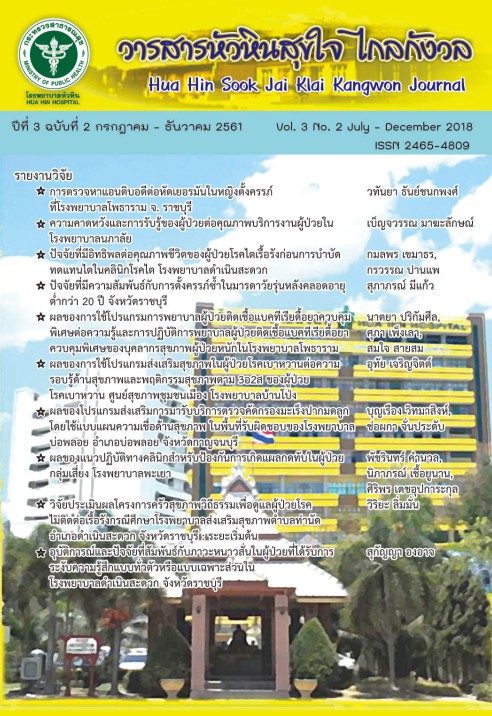EFFECTS OF HEALTH PROMOTION PROGRAMS ON HEALTH LITERACY AND HEALTH BEHAVIOR OF DIABETES PATIENTS OF COMMUNITY HEALTH CENTER BANPONG HOSPITAL
Keywords:
Health Promotion Program, Diabetes Patients, Health Literacy, Health behaviorAbstract
The purposes of this quasi-experimental research were to study and compare means of health literacy and health behavior of diabetes patients who received health promotion program service based on Pender’s theory under the program 4 times in 12 weeks, the sample was 30 experimental subjects. (The pretest-posttest One groups design). Data collecting by using the questionnaires on health literacy and health behavior of diabetes patients adapted from the questionnaires on health literacy and health behavior of Health Education Department. The Kuder-Richardson’s Reliability(KR20) of questionnaires try out in 30 diabetes patients who lived in rural area of Banpong district was 0.95. The comparison of means of health literacy and health behavior of diabetes patients was analyzed means between pre and post experimentation using Paired sample’s t-test. The research results indicated as follows: 1. Means of health literacy of diabetes patients of post- experimentation was statistically higher than pre-experimentation at 0.05 significant level. 2. Means of health behavior of diabetes patients of post- experimentation was statistically higher than pre-experimentation at 0.05 significant level. So diabetes patients ought to receive health promotion program service based on Pender’s theory. However, aging group is specifically considerable care giver or relatives in collaborate /join the group meeting. Telephone is the effective instrument for experienced care provider to empower health literacy and health behavior of diabetes patients. It is worth expanding to adoption in other care of NCDs in further.
References
สาธารณสุข ลิงค์จาก http://www.hed.go.th/news/3909
สมาคมโรคเบาหวานแห่งประเทศไทย. (2559). รายงานสถานการณ์โรค NCDs : มุ่งหน้าสู่เป้าหมายระดับโลก (kick off to the goals) ลิงค์จาก http://www.diabetesatlas.org
สำนักนโยบายและยุทธศาสตร์ กระทรวงสาธารณสุข, ยุทธศาสตร์ตัวชี้วัดและแนวทางการจัดเก็บข้อมูลทางด้านสาธารณสุขนนทบุรี:สำนักนโยบายและยุทธศาสตร์ ; 2558
รายงานสถิติข้อมูลเขตสุขภาพที่ 5 กระทรวงสาธารณสุขลิงค์จาก http://hdcservice. moph.go.th
รายงานสถิติเวชระเบียนผู้ป่วยเบาหวาน. ฝุายเวชระเบียนโรงพยาบาลบ้านโป่ง. ราชบุรี; 2557-2560
วชิระ เพ็งจันทร์. (2560). เอกสารประกอบการประชุมเชิงปฏิบัติการพัฒนาศักยภาพบุคลากรกรมอนามัยเรื่องความรอบรู้ด้านสุขภาพ (Health Literacy) 25 มกราคม 2560 : 203.157.62.15/anamai_Web/ewt_dl_link.php?nid=10221
สมฤทัย เพชรประยูร, ดวงรัตน์ วัฒนกิจไกรเลิศ. (2555). อิทธิพลของการรับรู้ความรุนแรงของโรค ความแตกฉานด้านสุขภาพและการสนับสนุนจากครอบครัวต่อพฤติกรรม การดูแลตนเองในผู้ป่วยเบาหวานชนิดที่ 2 มหาวิทยาลัยมหิดล
จุฑามณี กันกรุง. (2558). การศึกษาความฉลาดทางสุขภาวะของนักศึกษาปริญญาตรีมหาวิทยาลัยราชภัฏพิบูลสงคราม. วิทยานิพนธ์วิทยาศาสตรมหาบัณฑิตสาขาวิทยาศาสตร์สุขภาพ บัณฑิตวิทยาลัย มหาวิทยาลัยราชภัฏพิบูลสงคราม.
อารีย์ ธวัชวัฒนานันท์. (2557). ผลลัพธ์ของการใช้โปรแกรมส่งเสริมสุขภาพในผู้ป่วยที่มีภาวะเบาหวานขึ้นจอประสาทตา. วิทยานิพนธ์
มหาบัณฑิต. พยาบาลศาสตรมหาบัณฑิต(การพยาบาลผู้ใหญ่) บัณฑิตวิทยาลัย มหาวิทยาลัยคริสเตียน.
ศิริรัตน์ นาคงาม. (2559). การประยุกต์แบบจาลองข่าวสาร แรงจูงใจ และทักษะพฤติกรรมในการรับประทานยาของผู้ป่วยเบาหวาน โรงพยาบาลโพธาราม จังหวัดราชบุรี. วิทยานิพนธ์มหาบัณฑิต. พยาบาลศาสตรมหาบัณฑิต (การพยาบาลผู้ใหญ่) บัณฑิตวิทยาลัย มหาวิทยาลัยมหิดล.
Pender, N.J., Murdaugh, C.L., Parson, M.A. (2011). The Health Promotion Model Manual University of Michigan.Retrieved.
12 เมษายน 2556. Fromwww.http://nursing. Umich. Edu/faculty – staff/nola – j pende
จรณิต แก้วกังวาล และประตาป สิงหศิวานนท์. ขนาดกลุ่มตัวอย่างในการวิจัยทางคลินิก. ตาราวิจัยทางคลินิก 107-143 กรุงเทพฯ :
คณะเวชศาสตร์เขตร้อนมหาวิทยาลัยมหิดล, 2554. ลิงค์จาก http://www.tm.mahidol.ac.th/th/tropical-medicine-knowledge/bookclinic/
Textbook-of-Clinical
Downloads
Published
How to Cite
Issue
Section
License
บทความที่ได้รับการตีพิมพ์ในวารสารหัวหินเวชสาร เป็นลิขสิทธิ์ของโรงพยาบาลหัวหิน
บทความที่ลงพิมพ์ใน วารสารหัวหินเวชสาร ถือว่าเป็นความเห็นส่วนตัวของผู้เขียนคณะบรรณาธิการไม่จำเป็นต้องเห็นด้วย ผู้เขียนต้องรับผิดชอบต่อบทความของตนเอง







